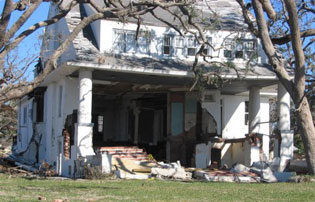 ALEXANDRIA, VA (August 28, 2006) - In the year since Hurricane Katrina struck the Gulf Coast, The Salvation Army has undertaken the largest disaster response effort in its history, allocating donations of more than $365 million to serve more than 1.7 million people in nearly every state. By way of comparison, the amount donated is more than three times greater than the $86 million given after September 11th -- the Army’s second largest mobilization.
ALEXANDRIA, VA (August 28, 2006) - In the year since Hurricane Katrina struck the Gulf Coast, The Salvation Army has undertaken the largest disaster response effort in its history, allocating donations of more than $365 million to serve more than 1.7 million people in nearly every state. By way of comparison, the amount donated is more than three times greater than the $86 million given after September 11th -- the Army’s second largest mobilization.
“The unbearable devastation wrought by Hurricane Katrina was met by the most incredible outpouring of support that we have ever seen from donors across the country and around the world,†said National Commander Israel L. Gaither. “And, we continue to be amazed by the number of volunteers who are offering their dedicated support. But, there is still much work to be done.â€
The Army’s immediate response to Hurricane Katrina included the mobilization of more than 178 canteen feeding units and 11 field kitchens which together have served more than 5.7 million hot meals, 8.3 million sandwiches, snacks & drinks. Its SATERN network of amateur ham-radio operators picked up where modern communications left off to help locate more than 25,000 survivors. And, Salvation Army pastoral care counselors were on hand to comfort the emotional and spiritual needs of 277,000 individuals.
Throughout the country, the Army’s existing Corps have accepted countless survivors into their traditional social service network to help families relocate and transition their lives. As part of the overall effort, Salvation Army officers, employees and volunteers have contributed more than 900,000 hours of service.
“This recovery is not over yet,†said Major Dalton Cunningham, Divisional Commander of The Salvation Army’s Alabama, Louisiana, and Mississippi Division. “One year barely covers the amount of time we’ll need. Many people throughout the Gulf Coast are still recovering from the shock while trying to rebuild their lives and resume some sense of normalcy. They need more help and we will continue to do all we can.â€
For the long-term the Army has shifted to recovery and rebuilding the hardest hit areas along the Gulf Coast. Half-way through its two-year minimum commitment, programs include:
• Volunteer villages in New Orleans, LA, and Biloxi, MS, to feed and house relief workers
• A Community Capacity Fund that provides financial and material assistance, such as school supplies, to local community organizations for projects that broadly benefit the community's survivors
• Community assistance centers which serve as the social service hub for survivors
• Partnerships with a variety of non-profit organizations that specialize in repairing or rebuilding homes in the most devastated communities
• Homeownership grants in partnership with Habitat for Humanity, and
• Employment education services through the National Business Service Alliance’s Job Readiness Training Program.
Of the $365 million received in public donations, $297million has been spent or allocated to be spent along the Gulf Coast. The additional $68 million is being used to help Katrina survivors who have relocated - particularly in Texas and the surrounding states of Oklahoma, Arkansas, and Florida. But this is truly a nationwide effort. In Kansas City, MO, for example, The Salvation Army has committed to helping over 300 Katrina evacuee families who have relocated to the area with practical assistance to help meet their daily needs.
Financial and in-kind donations were received from private donors throughout the country as well as many large gifts from a spectrum of corporations nationwide, including: Wal-Mart, BancorpSouth, Coca-Cola, and Pepsi Cola, among others.
The Army also participated in the Katrina Aid Today program, serving more than 16,000 households, or 42,000 individuals with clothing, food, shelter and other relief through in-depth case management. The Army, one of many non-profits participating, was funded by a $12 million grant from the United Methodist Committee on Relief (UMCOR), and was supplemented by $24 million from the Army’s own disaster relief fund.